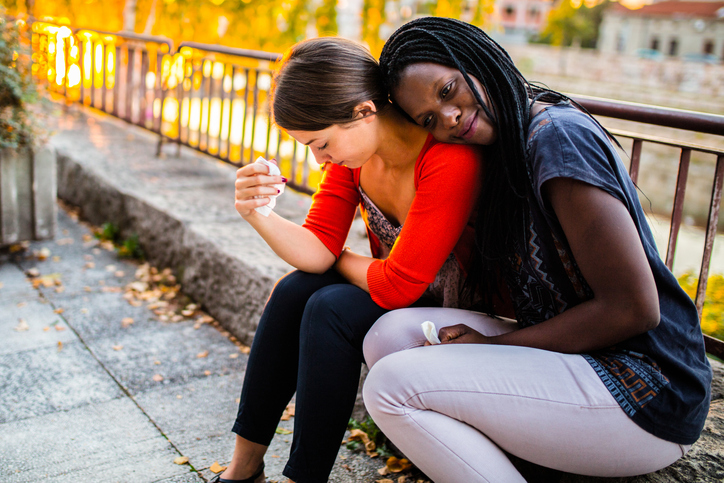What Not To Do When Someone Is Grieving
Looking For People To Perform Their Grief And 9 Other Things Not To Do When Someone Is Mourning
Share the post
Share this link via
Or copy link

Source: Robin Gentry / EyeEm / Getty
When a friend or loved one is mourning a loss, choosing the right words can be difficult. While we generally mean well, some of the common ways in which we respond to and interact with people in mourning only serve to anger them and add to their grief. In most cases, the grieving person may not tell you about how your words or actions have affected them. They may not even remember exactly what you said, but they will remember how you made them feel. This can often result in irreparable damage within the relationship. Here are ten things you should avoid doing when someone is grieving.
Expect them to perform their grief
Unfortunately, one person’s tragedy often serves as another’s entertainment. While it can be tempting to stalk a person’s social media accounts or watch them closely to see how they’re responding to the death of a loved one, remember that the person is genuinely hurting, regardless of how they’re handling it outwardly. Additionally, they can usually tell who is looking for a show.

Source: Klaus Vedfelt / Getty
Press for information
When a family is grieving the death of a loved one, always choose to offer a listening ear over a prying mouth. Depending on how the deceased passed, details may not be readily offered up by the family and that’s fine. Resist the urge to pry or ask invasive questions. You are not entitled to all of the details.

Source: Viktorcvetkovic / Getty
Try to put a positive spin on the death
Love MadameNoire? Get more! Join the MadameNoire Newsletter
We care about your data. See our privacy policy.
It’s best to recognize that it’s not your job to cheer up a person who is mourning. As a friend, you should just be there to help them get through the process. Trying to positively spin their loved one’s passing by saying things like, “But isn’t it wonderful that she gets to be with the Lord?” While the intent may pure, it feels disingenuous, as though you can’t get beyond your churchiness long enough to allow a person to feel sadness.

Source: Maksym Panchuk / EyeEm / Getty
Offer empty clichés
It can be difficult choosing the right thing to say when someone discloses that they’ve suffered a loss. As a result, we often regurgitate weak and thoughtless clichés in hopes that it will minimize the discomfort of the conversation and help the grieving person to feel better. In reality, empty words such as “death comes to us all” and “he’s in a better place” aren’t actually helpful at all.

Source: SDI Productions / Getty
Tell them you know how they feel
While you’re just trying to show a person that you share common ground with them, telling a person you know how they feel while they’re mourning a loss isn’t helpful. Instead, ask for permission to share your experience (if it’s a relevant one) and what helped you to get through that difficult period.

Source: Martin Novak / Getty
Provided unsolicited medical commentary
Unless you work in the medical field and have been asked by the person to give your opinion on the medical circumstances that led to the death of the deceased, it’s better to keep your theories and commentaries to yourself. In most cases, it is unhelpful and it can be upsetting to the person who is grieving.

Source: Viktorcvetkovic / Getty
Compare their loss to the death of your pet
Pets can certainly feel like part of the family, but as a rule of thumb, you should never compare the loss of your pet to the passing of a friend’s loved one. If you’re struggling to find a way to relate and that’s all you can come up with, simply tell them that you’re very sorry for their loss and stop there.

Source: NickyLloyd / Getty
Place blame
When faced with a tragedy, it can be easy to point fingers and place blame regarding what people did and did not do when the deceased was alive. However, this is counterproductive and is especially hurtful during an already trying time. Nothing you say will change what happened or bring the person back, but your words can definitely break the people who are still alive to hear you.

Source: Juanmonino / Getty
Tell them to be strong
Tears are not a sign of weakness. By suggesting that a person be strong while they are breaking down over a loss is not helpful and is rather insensitive. It can come off as though you’re asking them not to mourn their loss, which can cause anger and add to their grief.

Source: gradyreese / Getty
Tell them how to grieve
It’s not uncommon to hear people make comments such as, “Why is she out doing x,y,z when her father just died.” It’s very easy to look at home someone is coping with a loss and pass judgment, but you don’t know what it’s like to walk in that person’s shoes.
Related Tags
grief-

Meet Dominique Fils-Aimé, The Haitian-Canadian Star Redefining Jazz For A New Generation: ‘This is My Vision' [Exclusive]
-

Cooking With Purpose — How Brittney Williams Honors Her Caribbean Roots Through Food
-

9 Famous Lesbian Women Who Were Married To Men
-

Purpose Behind The Lens: How Nate Edwards Films The Extraordinary Inside The Everyday








